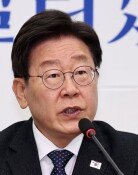Korea must prevent economy from falling into depression despite disaster
Korea must prevent economy from falling into depression despite disaster
Posted May. 01, 2014 06:55,
Economic activities are showing signs of slowdown on many fronts, as Korea as a whole is reeling from shock caused by the tragic sinking of the ferry Sewol. The aviation, tourism and lodging industries have received a flurry of cancelations, while department stores, large discounters and restaurants see the number of patrons decline. Various gatherings and events that were scheduled are being cancelled or postponed in droves. Bank of Korea Governor Lee Joo-yeol expressed concern on Tuesday, saying, The central bank is closely examining the potential impact of the Sewol sinking on the economy. With domestic consumption yet to return to full-blown recovery phase, a protracted slump in domestic consumption due to Sewol trauma could cause the economy to plummet anew.
Koreas real economic growth rate in the first quarter came to 3.9 percent year-on-year, the highest reading in three years, but a closer look at details reveal many worrisome factors. Quarterly private consumption growth slowed from 1.0 percent in the third quarter to 0.6 percent in the fourth quarter of last year, and to 0.3 percent in the first quarter of this year, receding for two consecutive quarters. Facility investment also declined 1.3 percent in the first quarter. The wons value against the dollar surged to the highest level in five years and eight months, adding to burden on price competitiveness of export, which has been buttressing the Korean economy.
As all attention was paid to the Sewol sinking, economy-related ministers meeting and international economy-related ministers meeting that were scheduled last week were cancelled. Routine business at economy-related ministries is operating as usual, but policy consultations between ministries and inter-ministry departments have effectively come to standstill. Moves to implement a three-year economic innovation plan and deregulation measures have also lost some momentum. Worse still, the mood in officialdom is unruly in general, as rumors over a large-scale Cabinet reshuffle have spread.
Apart from thorough investigation into the cause of the Sewol accident and recovery from the situation, it is about time that Korean society started paying attention to returning to ordinary days by overcoming the ramifications from the shocking disaster. If economic activities contract too sharply, it will add to burden on the livelihoods of working-class people more than any others, and cause significant damage to the national economy. It is desirable that Koreas economic players resume normal consumption activities to the extent that such activities would not hamper the mood for self-reflection and atonement.
The government should make sure that the realty market, which has shown signs of gradual rebound, would not recede again, and implement as planned key policy measures, including lifting and easing of unnecessary regulations and innovation of state-run firms. Top economic officials of the government, including Hyun Oh-seok, Deputy Prime Minister for Economy and Cho Won-dong, presidential secretary for economic affairs, should stay vigilant and redouble efforts to prevent the economy from falling into recession.







